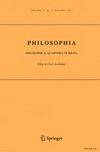米什切维奇和阶段性防御
IF 0.5
4区 哲学
0 PHILOSOPHY
引用次数: 0
摘要
米斯切维奇认为思想实验表现出大量的典型阶段,本文正是基于这一观点,研究了米斯切维奇对限制论X-phi的辩护。根据米斯切维奇的观点,X-phi 否定方案的支持者所指出的认识论威胁可以在不同阶段以不同方式加以反驳或改善。我认为,他的辩护不足以反驳特别是马切利的论点。本文章由计算机程序翻译,如有差异,请以英文原文为准。
Miscevic and the Stages Defence
This contribution examines Miscevic’s defence against restrictionist X-phi, based on his view that thought experiments exhibit a large number of typical stages. On Miscevic’s view, the epistemic threats identified by proponents of the negative program in X-phi may be countered or ameliorated in various ways at various stages. I argue that the defence he offers is insufficient to counter the arguments by in particular Machery.
求助全文
通过发布文献求助,成功后即可免费获取论文全文。
去求助
来源期刊

PHILOSOPHIA
PHILOSOPHY-
CiteScore
0.90
自引率
20.00%
发文量
141
期刊介绍:
Founded in 1971, Philosophia is a much-respected journal that has provided a platform to many well-known philosophers, including Kenneth Arrow, A.J. Ayer, Roderick Chisholm, Bas van Fraassen, William Frankena, P.T. Geach, Alan Gewirth, Jaakko Hintikka, Richard Popkin, W.V.O. Quine, Gilbert Ryle, Marcus Singer, Peter Singer, J.J.C. Smart, P.F. Strawson, and many others. Philosophia also published papers of Ludwig Wittgenstein and Rudolf Carnap.
Philosophia is an international journal in scope, submissions and readership. The journal publishes contributions fitting within various philosophical traditions, but manifests a preference of the analytic tradition in the broad sense of commitment to clarity and responsibility.
Besides papers in the traditional subfields of philosophy and its history, Philosophia also publishes work on topical subjects such as racism, silence of God, terrorism, the nature of philosophy, emotion, AIDS, scientific discovery, punishment, modality, and institutional theory of art.
Philosophia welcomes a wide range of contributions to academic philosophy, covering all fields of philosophy. Contributions to the journal may take the form of topical papers, philosophical surveys of literature, symposia papers, short discussion notes, puzzles, profiles, book reviews and more extensive critical studies of new books. The journal includes a ''books revisited'' section where a book and its impact are reconsidered a decade or more after its appearance. Double-blind review procedure The journal follows a double-blind reviewing procedure. Authors are therefore requested to place their name and affiliation on a separate page. Self-identifying citations and references in the article text should either be avoided or left blank when manuscripts are first submitted. Authors are responsible for reinserting self-identifying citations and references when manuscripts are prepared for final submission.Please read our Editorial Policies carefully before you submit your paper to this journal https://www.springer.com/gp/editorial-policies
 求助内容:
求助内容: 应助结果提醒方式:
应助结果提醒方式:


